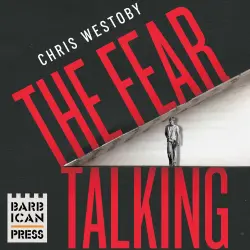
There Is No Blue
Martha Baillie
Unabridged
6 horas 29 minutos
Nota: La reproducción de los audiolibros o de las obras de audio en las respectivas plataformas, por ejemplo Spotify, puede generar gastos. Lismio no tiene ninguna influencia sobre qué audiolibros y obras de audio están disponibles en el servicio.
Algunos artículos contienen enlaces de afiliados (marcados con un asterisco *). Si hace clic en estos enlaces y compra productos, recibiremos una pequeña comisión sin coste adicional para usted. Su apoyo ayuda a mantener este sitio en funcionamiento y a seguir creando contenidos útiles. Gracias por su apoyo.
De la editorial
THE GLOBE AND MAIL: BOOKS TO READ IN FALL 2023
Martha Baillie's richly layered response to her mother's passing, her father's life, and her sister's suicide is an exploration of how the body, the rooms we inhabit, and our languages offer the psyche a home, if only for a time.
Three essays, three deaths. The first is the death of the author's mother, a protracted disappearance, leaving space for thoughtfulness and ritual: the washing of her body, the making of a death mask. The second considers Baillie's father, his remoteness, his charm, a lacuna at the center of the family even before his death, earlier than her mother's. And then, third, shockingly, the author's sister, a visual artist and writer living with a diagnosis of schizophrenia, who writes three reasons to die on her bedroom wall and then takes her life, just before the book the sisters co-authored is due to come out.
In this close observation of a family, few absolutes hold, as experiences of reality diverge. A memoir of cascading grief and survival from the author of The Incident Report.
"Martha Baillie's novels are thrillingly, joyously singular, that rare combination of sui generis and just plain generous. That There Is No Blue, her memoir, is all of those things too, is no surprise; still, she has gone somewhere extraordinary. This triptych of essays, which exquisitely unfolds the "disobedient tale" of the lives and deaths of her mother, her father, and her sister, is a meditation on the mystery and wonder of grief and art making and home and memory itself. It made me think of kintsugi, the Japanese art of repair, in which the mending is not hidden but featured and beautifully illuminated. Baillie's variety of attention, carved out of language, is tenderness, is love." - Maud Casey, author of City of Incurable Women
"This is a stunning memoir, intense and meticulous in its observations of family life. Baillie subtly interrogates and conveys the devastating mistranslations that take place in childhood, the antagonism and porousness of siblings, and the tragedy of schizophrenia as it unfolds. I couldn't put it down." - Dr. Lisa Appignanesi, author of Mad, Bad and Sad and Everyday Madness
"Exquisite." - Souvankham Thammavongsa, author of How to Pronounce Knife
"I am grateful for this profound meditation on family and loss." - Charlie Kaufman, filmmaker
"This strange, unsettling memoir of outer life and inner life and their bizarre twining captures the author's identity by way of her mother's death, her sister's failing battle with mental illness, and the mysterious figure of her father. It combines anguished guilt, deep tenderness, and bemused affection in highly evocative, often disturbing prose. Its brave honesty is amplified by a persistent lyricism; its undercurrent of fear is uplifted by a surprising, resilient hopefulness. It is both a plea for exoneration and an act of exoneration, an authentic meditation on the terrible difficulty of being human." - Andrew Solomon, author of The Noonday Demon
Martha Baillie's richly layered response to her mother's passing, her father's life, and her sister's suicide is an exploration of how the body, the rooms we inhabit, and our languages offer the psyche a home, if only for a time.
Three essays, three deaths. The first is the death of the author's mother, a protracted disappearance, leaving space for thoughtfulness and ritual: the washing of her body, the making of a death mask. The second considers Baillie's father, his remoteness, his charm, a lacuna at the center of the family even before his death, earlier than her mother's. And then, third, shockingly, the author's sister, a visual artist and writer living with a diagnosis of schizophrenia, who writes three reasons to die on her bedroom wall and then takes her life, just before the book the sisters co-authored is due to come out.
In this close observation of a family, few absolutes hold, as experiences of reality diverge. A memoir of cascading grief and survival from the author of The Incident Report.
"Martha Baillie's novels are thrillingly, joyously singular, that rare combination of sui generis and just plain generous. That There Is No Blue, her memoir, is all of those things too, is no surprise; still, she has gone somewhere extraordinary. This triptych of essays, which exquisitely unfolds the "disobedient tale" of the lives and deaths of her mother, her father, and her sister, is a meditation on the mystery and wonder of grief and art making and home and memory itself. It made me think of kintsugi, the Japanese art of repair, in which the mending is not hidden but featured and beautifully illuminated. Baillie's variety of attention, carved out of language, is tenderness, is love." - Maud Casey, author of City of Incurable Women
"This is a stunning memoir, intense and meticulous in its observations of family life. Baillie subtly interrogates and conveys the devastating mistranslations that take place in childhood, the antagonism and porousness of siblings, and the tragedy of schizophrenia as it unfolds. I couldn't put it down." - Dr. Lisa Appignanesi, author of Mad, Bad and Sad and Everyday Madness
"Exquisite." - Souvankham Thammavongsa, author of How to Pronounce Knife
"I am grateful for this profound meditation on family and loss." - Charlie Kaufman, filmmaker
"This strange, unsettling memoir of outer life and inner life and their bizarre twining captures the author's identity by way of her mother's death, her sister's failing battle with mental illness, and the mysterious figure of her father. It combines anguished guilt, deep tenderness, and bemused affection in highly evocative, often disturbing prose. Its brave honesty is amplified by a persistent lyricism; its undercurrent of fear is uplifted by a surprising, resilient hopefulness. It is both a plea for exoneration and an act of exoneration, an authentic meditation on the terrible difficulty of being human." - Andrew Solomon, author of The Noonday Demon














